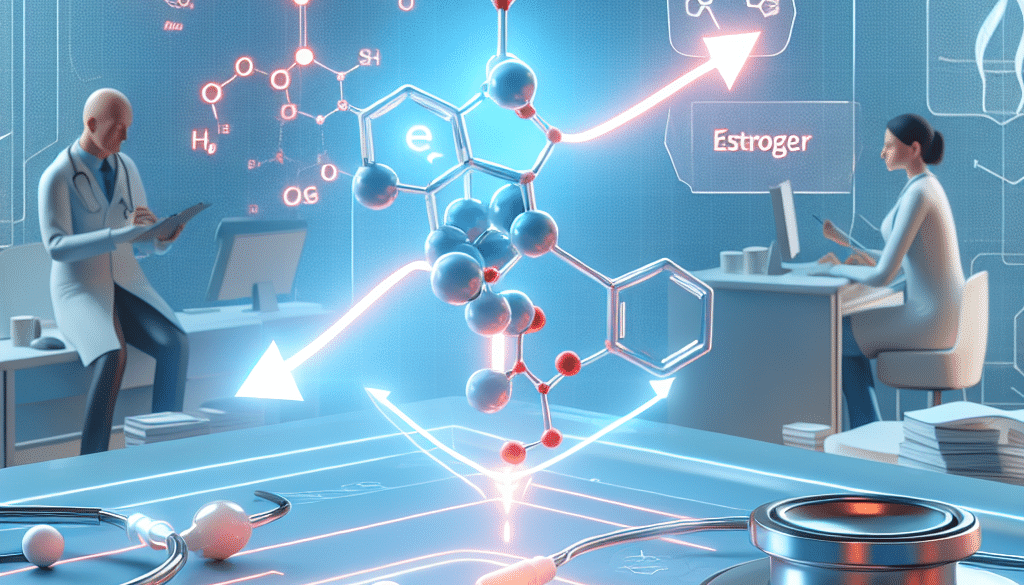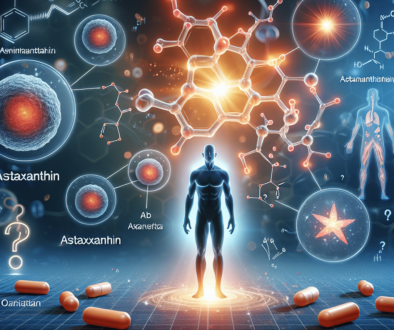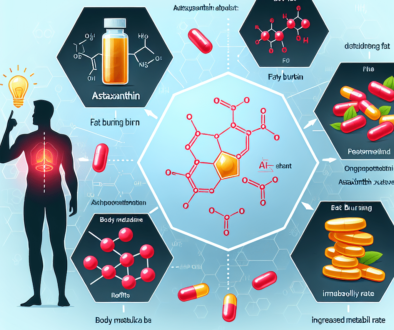Does Astaxanthin Increase Estrogen?
-
Table of Contents
- Astaxanthin and Estrogen: Exploring the Connection
- Understanding Astaxanthin
- Estrogen: A Hormonal Overview
- Does Astaxanthin Increase Estrogen?
- Potential Benefits and Considerations
- Case Studies and Statistics
- Conclusion: Key Takeaways on Astaxanthin and Estrogen
- Enhance Your Health with ETprotein’s Premium Protein Products
Astaxanthin and Estrogen: Exploring the Connection
As the quest for natural health supplements continues, astaxanthin, a powerful antioxidant, has garnered significant attention. Known for its potential benefits ranging from improved skin health to enhanced athletic performance, astaxanthin is a carotenoid that occurs naturally in certain algae and seafood. However, one question that often arises is whether astaxanthin has any effect on estrogen levels in the body. This article delves into the scientific research to explore the relationship between astaxanthin and estrogen, providing insights into whether this antioxidant can influence hormonal balance.
Understanding Astaxanthin
Astaxanthin is a keto-carotenoid that belongs to a larger class of phytochemicals known as terpenes. It is responsible for the pink and red hues found in salmon, shrimp, lobster, and the microalgae Haematococcus pluvialis, which is the primary source for commercially produced astaxanthin supplements. As an antioxidant, astaxanthin is renowned for its ability to neutralize free radicals and protect cells from oxidative damage.
Estrogen: A Hormonal Overview
Estrogen is a primary female sex hormone, although it is also present in males in smaller amounts. It plays a crucial role in the development of female secondary sexual characteristics and the regulation of the menstrual cycle. In men, estrogen supports sperm maturation and libido. The balance of estrogen levels is vital for overall health, and any disruption can lead to various health issues.
Does Astaxanthin Increase Estrogen?
The question of whether astaxanthin increases estrogen levels is complex and requires a look at the available scientific evidence. Research on astaxanthin’s impact on hormonal levels, including estrogen, is still in its early stages, with mixed results.
- Animal Studies: Some animal studies have suggested that astaxanthin may have an influence on estrogen levels. For example, a study on rats indicated that astaxanthin might have estrogenic effects, potentially affecting reproductive health. However, these results cannot be directly extrapolated to humans without further research.
- Human Studies: In contrast to animal studies, human research on astaxanthin’s impact on estrogen is limited and has not shown a definitive connection. A few studies have examined the effects of astaxanthin on postmenopausal women, but the results have been inconclusive regarding its impact on estrogen levels.
- In Vitro Studies: Laboratory studies have explored the potential estrogenic activity of astaxanthin, with some findings indicating that it may exhibit weak estrogenic effects under certain conditions. However, these in vitro results do not necessarily reflect what would happen in a living organism.
Given the current state of research, it is not possible to conclusively state that astaxanthin increases estrogen levels in humans. More comprehensive studies are needed to understand the potential hormonal effects of astaxanthin supplementation.
Potential Benefits and Considerations
While the impact of astaxanthin on estrogen remains uncertain, its other potential health benefits are worth considering:
- Antioxidant Properties: Astaxanthin’s potent antioxidant capabilities can help combat oxidative stress and may reduce the risk of chronic diseases.
- Skin Health: Astaxanthin has been shown to improve skin elasticity, hydration, and overall appearance.
- Eye Health: Its antioxidant effects may also benefit eye health by reducing the risk of age-related macular degeneration.
- Exercise Recovery: Some studies suggest that astaxanthin can enhance recovery from exercise-induced muscle damage.
However, individuals considering astaxanthin supplements should consult with a healthcare provider, especially if they have hormone-sensitive conditions or are taking medications that could interact with the supplement.
Case Studies and Statistics
While comprehensive human studies are lacking, some case studies and small-scale research projects have provided insights into astaxanthin’s effects on health. For instance, a study involving middle-aged female participants showed that astaxanthin supplementation improved skin condition and elasticity. Another study on athletes found that astaxanthin reduced muscle damage and inflammation post-exercise.
Statistics from the supplement industry indicate that the popularity of astaxanthin is on the rise, with the global market expected to grow significantly in the coming years. This growth is partly due to increased awareness of its potential health benefits and the demand for natural wellness products.
Conclusion: Key Takeaways on Astaxanthin and Estrogen
In conclusion, while astaxanthin is a promising natural supplement with a range of potential health benefits, the evidence regarding its effect on estrogen levels is not definitive. Current research does not provide enough data to confirm that astaxanthin increases estrogen in humans. Individuals interested in taking astaxanthin should do so with an understanding of its benefits and potential considerations, and always in consultation with a healthcare professional.
Enhance Your Health with ETprotein’s Premium Protein Products
If you’re looking to complement your health regimen with high-quality protein sources, consider ETprotein’s range of organic bulk vegan proteins and L-(+)-Ergothioneine (EGT). Their products are designed to meet the needs of various industries, including nutraceuticals, pharmaceuticals, and food and beverage sectors. With a commitment to non-GMO, allergen-free ingredients, and high purity standards, ETprotein is a trusted supplier for consumers seeking to enhance their health and wellness.
About ETprotein:
ETprotein, a reputable protein and L-(+)-Ergothioneine (EGT) Chinese factory manufacturer and supplier, is renowned for producing, stocking, exporting, and delivering the highest quality organic bulk vegan proteins and L-(+)-Ergothioneine. They include Organic rice protein, clear rice protein, pea protein, clear pea protein, watermelon seed protein, pumpkin seed protein, sunflower seed protein, mung bean protein, peanut protein, and L-(+)-Ergothioneine EGT Pharmaceutical grade, L-(+)-Ergothioneine EGT food grade, L-(+)-Ergothioneine EGT cosmetic grade, L-(+)-Ergothioneine EGT reference grade and L-(+)-Ergothioneine EGT standard. Their offerings, characterized by a neutral taste, non-GMO, allergen-free attributes, with L-(+)-Ergothioneine purity over 98%, 99%, cater to a diverse range of industries. They serve nutraceutical, pharmaceutical, cosmeceutical, veterinary, as well as food and beverage finished product distributors, traders, and manufacturers across Europe, USA, Canada, Australia, Thailand, Japan, Korea, Brazil, and Chile, among others.
ETprotein specialization includes exporting and delivering tailor-made protein powder and finished nutritional supplements. Their extensive product range covers sectors like Food and Beverage, Sports Nutrition, Weight Management, Dietary Supplements, Health and Wellness Products, and Infant Formula, ensuring comprehensive solutions to meet all your protein needs.
As a trusted company by leading global food and beverage brands and Fortune 500 companies, ETprotein reinforces China’s reputation in the global arena. For more information or to sample their products, please contact them and email sales(at)ETprotein.com today.











